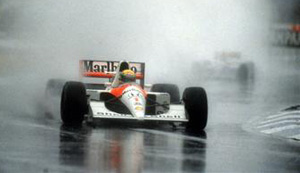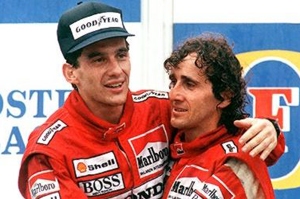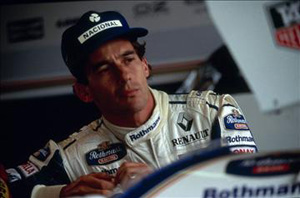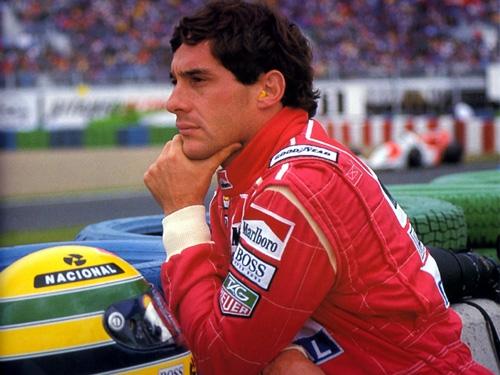Notwithstanding legends of earlier generations such as Fangio or Jim Clark, it's Ayrton Senna whose name commands the most mystique in the annals of Formula One motor racing. Nor is his reputation limited merely to so-called "petrolheads". Away from the track, he became a kind of deity in his native Brazil, both for his racing feats and his charitable endeavours now continued by the Instituto Ayrton Senna.
But he was a complex character, spiritual, deeply religious, yet brutally pragmatic. While he's viewed as a supernatural phenomenon by many, there was a dark and ruthless side to his personality, at least once he was behind the wheel of a racing car.
Not that you really get a full flavour of that here. Asif Kapadia and Manish Pandey's documentary has been made with the co-operation of the Senna family, who have always been ferociously protective of Ayrton's memory. Hence it isn't particularly startling to find the triple world champion portrayed as a natural genius beset by political shenanigans and conspiracies, even as he clawed his way to the pinnacle of his sport (Senna in the rain, Adelaide 1992, pictured below).
 Nonetheless, it's a must-see for any motorsport fan, both for its portrait of Senna's incandescent career and its tragic end with his fatal crash at Imola in 1994, and for the way it conveys the sheer physical rush of pushing an F1 car to its limits. The sense of total immersion is enhanced by the way it's constructed entirely from archive material, with all interviews knitted in as voiceover rather than as talking heads. There's oodles of priceless, previously unseen racing and behind-the-scenes footage from the Biggin Hill vaults of F1's eminence grise Bernie Ecclestone, and the film opens with Senna's precocious assault on the 1984 Monaco Grand Prix.
Nonetheless, it's a must-see for any motorsport fan, both for its portrait of Senna's incandescent career and its tragic end with his fatal crash at Imola in 1994, and for the way it conveys the sheer physical rush of pushing an F1 car to its limits. The sense of total immersion is enhanced by the way it's constructed entirely from archive material, with all interviews knitted in as voiceover rather than as talking heads. There's oodles of priceless, previously unseen racing and behind-the-scenes footage from the Biggin Hill vaults of F1's eminence grise Bernie Ecclestone, and the film opens with Senna's precocious assault on the 1984 Monaco Grand Prix.
Senna is in his rookie season, driving a lowly Toleman car, and is hurtling round the tricky principality street circuit through driving rain in pursuit of Alain Prost's McLaren. Rocketing through chicanes and squeezing precipitously between kerbs, Senna was about to overtake potential world champion Prost when officials stopped the race because of bad weather.
 It was a controversial decision at the time, and sets the tone for the film's dominant theme of the rivalry between Prost and Senna (pictured together, left), which kicked off in earnest when Senna joined Prost at McLaren in 1988. Several of the notorious flashpoints between the pair are covered, particularly the collisions between them at Suzuka in 1989 and 1990. The first gave Prost the championship, and with the second Senna got his revenge by deliberately driving into Prost (by now driving a Ferrari) at 150mph. The way the story is recounted here, Prost was engaged in a Gallic conspiracy with Jean-Marie Balestre, the blustering and bombastic president of the sport's governing body FISA, who didn't hesitate to bend the rules to ensure victory for his fellow Frenchman.
It was a controversial decision at the time, and sets the tone for the film's dominant theme of the rivalry between Prost and Senna (pictured together, left), which kicked off in earnest when Senna joined Prost at McLaren in 1988. Several of the notorious flashpoints between the pair are covered, particularly the collisions between them at Suzuka in 1989 and 1990. The first gave Prost the championship, and with the second Senna got his revenge by deliberately driving into Prost (by now driving a Ferrari) at 150mph. The way the story is recounted here, Prost was engaged in a Gallic conspiracy with Jean-Marie Balestre, the blustering and bombastic president of the sport's governing body FISA, who didn't hesitate to bend the rules to ensure victory for his fellow Frenchman.
There's probably some truth in it, but Kapadia and Pandey have omitted Senna's own dirty tricks, like trying to drive Prost into walls or breaking agreements the pair had made about tactics. His win-at-all-costs approach effectively transformed the ethical basis of motor racing, and was later perfected by Michael Schumacher.
But there's no mistaking Senna's instinctive brilliance - though, as with Schumacher, you have to wonder why so gifted a driver had to resort to such extremes - and the film also conveys the unusual layers of his personality which set him apart from his peers. This was, after all, the man who claimed he'd seen a divine vision when he won his first world championship in Japan in 1988. Access to the Senna family archives has yielded priceless home-movie footage of Senna relaxing at home in Brazil, sailing boats or mucking about with model aircraft, and his parents' ambivalent view of their son's career - pride in his abilities, mixed with apprehension about the risks - is touchingly caught. It's also striking how thoughtful and introspective Senna could be in interviews, and while he displayed steely single-mindedness on the track, he was deeply affected by accidents involving other drivers (Senna driving for Williams in 1994, pictured below).
 All of this comes to a head in the ghastly weekend at Imola that saw not only Senna's death, but also that of Austrian driver Roland Ratzenburger, as well as a near-fatal crash by Senna's fellow Brazilian Rubens Barrichello. It's as if the film-makers were trying to evoke an almost road-to-Calvary atmosphere in this climactic sequence, building a sense of terrible foreboding with revealing shots of Senna's face as he watches the weekend's violent events unfolding on pitlane TV monitors. He was clearly shaken and reluctant to start the race, and the F1 doctor Sid Watkins even tried to talk him out of taking part, but... you know the rest.
All of this comes to a head in the ghastly weekend at Imola that saw not only Senna's death, but also that of Austrian driver Roland Ratzenburger, as well as a near-fatal crash by Senna's fellow Brazilian Rubens Barrichello. It's as if the film-makers were trying to evoke an almost road-to-Calvary atmosphere in this climactic sequence, building a sense of terrible foreboding with revealing shots of Senna's face as he watches the weekend's violent events unfolding on pitlane TV monitors. He was clearly shaken and reluctant to start the race, and the F1 doctor Sid Watkins even tried to talk him out of taking part, but... you know the rest.
For a coda, there's a clip of Senna talking nostalgically about his early days in go-karts, when it was purely about racing with none of the politics and skulduggery of big-money Formula One. But he was on a mission to become world champion, and he knew there was no alternative.
Watch Top Gear's tribute to Ayrton Senna















Add comment